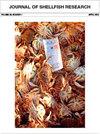Effect of Predator Exclusion on Softshell Clam (Mya arenaria L.) Recruitment
IF 1
4区 农林科学
Q3 FISHERIES
引用次数: 0
Abstract
ABSTRACT Despite estimates of very high (>99.9%) pre-settlement mortality, the extremely large numbers of eggs released into the plankton means that there are abundant post-larval softshell clams (Mya arenaria) available to settle and populate intertidal flats. Many seemingly suitable flats remain devoid of clams, presumably due to post-settlement predation. Predator exclusion/clam recruitment boxes (wooden frames covered top and bottom with a fine plastic screening) were set on a mudflat in Salem Harbor, Salem, MA from April to November 2019. Clam larvae were able to settle through the screen into the boxes but large (>1.9 mm) predators such as European green crabs (Carcinus maenas) and milky ribbon worms (Cerebratulus lacteus) were excluded. At the end of the study, four of five boxes contained between 121 and 290 juvenile softshell clams ranging in size from 7 mm to 32 mm shell length. A bimodal frequency distribution of sizes likely illustrates an early summer (June) set represented by a larger size grouping followed by a second late-summer set represented by a smaller size grouping. Small green crabs (9–46 mm carapace width) found in all five boxes must have grown from extremely small stage 1 crabs that were able to settle or crawl through the screening as recently settled individuals. Resulting empty clam shells could be paired to yield the equivalent of additional clams, making the total number per box between 147 and 417 individuals. No clams were found in samples outside of the boxes, indicating that the absence of a clam population on the mudflat is due to post-settlement predation and not pre-settlement mortality.捕食者排斥对软壳蛤(Mya arenaria L.)的影响招聘
尽管估计沉降前死亡率非常高(约99.9%),但释放到浮游生物中的大量卵意味着有大量的幼虫后软壳蛤(Mya arenaria)可在潮间带定居和繁殖。许多看似合适的公寓仍然没有蛤蜊,大概是由于定居后的捕食。2019年4月至11月,在马萨诸塞州塞勒姆塞勒姆港的一个泥滩上设置了捕食者排除/蛤招募箱(顶部和底部覆盖有精细塑料筛网的木制框架)。蛤蜊幼虫能够通过屏障进入盒子,但大型(>1.9毫米)捕食者,如欧洲绿蟹(Carcinus maenas)和乳白色带蠕虫(Cerebratulus lacteus)被排除在外。在研究结束时,五个盒子中的四个盒子里有121到290只幼小的软壳蛤,壳长从7毫米到32毫米不等。尺寸的双峰频率分布可能说明了由较大尺寸分组代表的初夏(6月)集,其次是由较小尺寸分组代表的第二个夏末集。在所有五个盒子中发现的小绿蟹(9-46毫米的壳宽)一定是从非常小的1期螃蟹生长而来的,这些螃蟹能够在筛网中定居或爬行,就像最近定居的个体一样。由此产生的空蛤壳可以配对产生相当于额外的蛤,使每个盒子的总数在147到417个之间。在箱子外的样本中没有发现蛤蜊,这表明泥滩上没有蛤蜊种群是由于定居后的捕食而不是定居前的死亡。
本文章由计算机程序翻译,如有差异,请以英文原文为准。
求助全文
约1分钟内获得全文
求助全文
来源期刊

Journal of Shellfish Research
生物-海洋与淡水生物学
CiteScore
2.30
自引率
0.00%
发文量
40
审稿时长
6 months
期刊介绍:
Original articles dealing with all aspects of shellfish research will be considered for publication. Manuscripts will be judged by the editors or other competent reviewers, or both, on the basis of originality, content, merit, clarity of presentation, and interpretations.
 求助内容:
求助内容: 应助结果提醒方式:
应助结果提醒方式:


